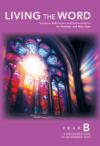Scripture Study for
The Most Holy Trinity
Proverbs 8:22–31 / Psalm 8:2a / Romans 5:1–5 / John 16:12–15
<< Back to LECTIONARY RESOURCES
Understanding the Word
By Dianne Bergant, C.S.A.
The created world is beautifully portrayed in today’s reading. There is no cosmic battle here, as is found in some of the other ancient creation myths. There is only one God who effortlessly establishes the entire universe in tranquility and order. There is rejoicing in this created world. God delights in Woman Wisdom; Woman Wisdom rejoices before God. Wisdom also takes delight in the inhabited part of the earth and in the human race. The last verse leaves us on an open threshold, gazing at the universe that unfolds before us, aware that this mysterious primordial figure of Wisdom has a special interest in us.
According to Paul, the justification of the Roman Christians is an accomplished fact. They have already been reconciled with God; their guilt has already been forgiven. Though God is really the author of their justification, it has been accomplished through their faith in Jesus Christ, who through his death and resurrection has reconciled all people with God. Believers still wait in hope for God’s ultimate glory. Here is an example of Paul’s already-but-not-yet thinking about the end times. The Trinitarian nature of Paul’s faith and teaching is clear: Christ brings us to God, and the Spirit comes to us from that same God.
The Gospel explains the relationship between the Father, Jesus, and the Spirit by relating all three to the teaching of Jesus. The Spirit will fill the void caused by Jesus’ absence, not so much with a presence as with a form of teaching. It will be through the unfolding of this teaching that the Spirit will glorify Jesus, and reveal him to be the chosen one of God. It was from the Father that the Spirit heard the teachings of Jesus, and then it was also from the Father that the Spirit was sent to bring these teachings to fruition. The Spirit glorifies Jesus by bringing to light the deeper truth of his teaching, teaching that also belongs to God.
